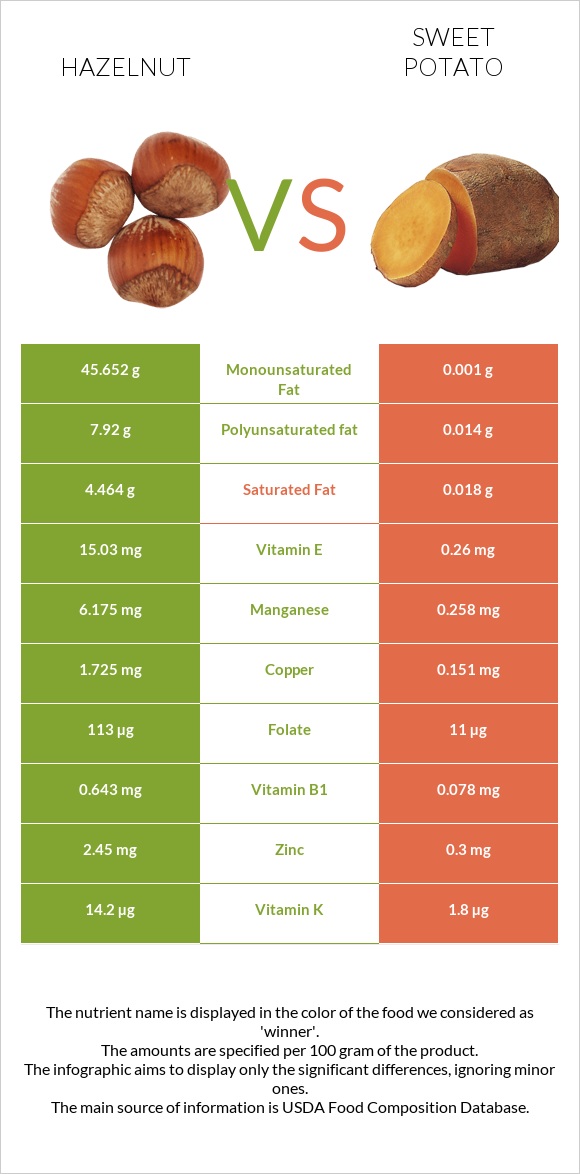Hazelnut vs. Sweet potato — In-Depth Nutrition Comparison
Compare
What are the differences between hazelnut and sweet potato?
- Hazelnut is higher in manganese, copper, vitamin E, iron, vitamin B1, phosphorus, magnesium, vitamin B6, and fiber, yet sweet potato is higher in vitamin A.
- Sweet potato's daily need coverage for vitamin A is 283% more.
- Hazelnut has 58 times more vitamin E than sweet potato. While hazelnut has 15.03mg of vitamin E, sweet potato has only 0.26mg.
- The glycemic index of hazelnut is lower.
We used Nuts, hazelnuts or filberts and Sweet potato, raw, unprepared types in this article.
Infographic

Infographic link
Mineral Comparison
Mineral comparison score is based on the number of minerals by which one or the other food is richer. The "coverage" charts below show how much of the daily needs can be covered by 300 grams of the food.
| Contains more MagnesiumMagnesium | +552% |
| Contains more CalciumCalcium | +280% |
| Contains more PotassiumPotassium | +101.8% |
| Contains more IronIron | +670.5% |
| Contains more CopperCopper | +1042.4% |
| Contains more ZincZinc | +716.7% |
| Contains more PhosphorusPhosphorus | +517% |
| Contains less SodiumSodium | -100% |
| Contains more ManganeseManganese | +2293.4% |
| Contains more SeleniumSelenium | +300% |
Vitamin Comparison
Vitamin comparison score is based on the number of vitamins by which one or the other food is richer. The "coverage" charts below show how much of the daily needs can be covered by 300 grams of the food.
| Contains more Vitamin CVitamin C | +162.5% |
| Contains more Vitamin EVitamin E | +5680.8% |
| Contains more Vitamin B1Vitamin B1 | +724.4% |
| Contains more Vitamin B2Vitamin B2 | +85.2% |
| Contains more Vitamin B3Vitamin B3 | +223.2% |
| Contains more Vitamin B5Vitamin B5 | +14.8% |
| Contains more Vitamin B6Vitamin B6 | +169.4% |
| Contains more Vitamin KVitamin K | +688.9% |
| Contains more FolateFolate | +927.3% |
| Contains more Vitamin AVitamin A | +70800% |
All nutrients comparison - raw data values
| Nutrient |  |
 |
DV% diff. |
| Manganese | 6.175mg | 0.258mg | 257% |
| Copper | 1.725mg | 0.151mg | 175% |
| Monounsaturated fat | 45.652g | 0.001g | 114% |
| Vitamin E | 15.03mg | 0.26mg | 98% |
| Fats | 60.75g | 0.05g | 93% |
| Vitamin A | 1µg | 709µg | 79% |
| Polyunsaturated fat | 7.92g | 0.014g | 53% |
| Iron | 4.7mg | 0.61mg | 51% |
| Vitamin B1 | 0.643mg | 0.078mg | 47% |
| Phosphorus | 290mg | 47mg | 35% |
| Magnesium | 163mg | 25mg | 33% |
| Calories | 628kcal | 86kcal | 27% |
| Protein | 14.95g | 1.57g | 27% |
| Fiber | 9.7g | 3g | 27% |
| Vitamin B6 | 0.563mg | 0.209mg | 27% |
| Folate | 113µg | 11µg | 26% |
| Zinc | 2.45mg | 0.3mg | 20% |
| Saturated fat | 4.464g | 0.018g | 20% |
| Potassium | 680mg | 337mg | 10% |
| Vitamin K | 14.2µg | 1.8µg | 10% |
| Calcium | 114mg | 30mg | 8% |
| Vitamin B3 | 1.8mg | 0.557mg | 8% |
| Choline | 45.6mg | 12.3mg | 6% |
| Starch | 0.48g | 12.65g | 5% |
| Vitamin C | 6.3mg | 2.4mg | 4% |
| Vitamin B2 | 0.113mg | 0.061mg | 4% |
| Selenium | 2.4µg | 0.6µg | 3% |
| Sodium | 0mg | 55mg | 2% |
| Vitamin B5 | 0.918mg | 0.8mg | 2% |
| Carbs | 16.7g | 20.12g | 1% |
| Fructose | 0.07g | 0.7g | 1% |
| Net carbs | 7g | 17.12g | N/A |
| Sugar | 4.34g | 4.18g | N/A |
| Tryptophan | 0.193mg | 0.031mg | 0% |
| Threonine | 0.497mg | 0.083mg | 0% |
| Isoleucine | 0.545mg | 0.055mg | 0% |
| Leucine | 1.063mg | 0.092mg | 0% |
| Lysine | 0.42mg | 0.066mg | 0% |
| Methionine | 0.221mg | 0.029mg | 0% |
| Phenylalanine | 0.663mg | 0.089mg | 0% |
| Valine | 0.701mg | 0.086mg | 0% |
| Histidine | 0.432mg | 0.031mg | 0% |
Macronutrient Comparison
Macronutrient breakdown side-by-side comparison
Protein:
14.95 g
Fats:
60.75 g
Carbs:
16.7 g
Water:
5.31 g
Other:
2.29 g
Protein:
1.57 g
Fats:
0.05 g
Carbs:
20.12 g
Water:
77.28 g
Other:
0.98 g
| Contains more ProteinProtein | +852.2% |
| Contains more FatsFats | +121400% |
| Contains more OtherOther | +133.7% |
| Contains more CarbsCarbs | +20.5% |
| Contains more WaterWater | +1355.4% |
Fat Type Comparison
Fat type breakdown side-by-side comparison
Saturated fat:
Sat. Fat
4.464 g
Monounsaturated fat:
Mono. Fat
45.652 g
Polyunsaturated fat:
Poly. Fat
7.92 g
Saturated fat:
Sat. Fat
0.018 g
Monounsaturated fat:
Mono. Fat
0.001 g
Polyunsaturated fat:
Poly. Fat
0.014 g
| Contains more Mono. FatMonounsaturated fat | +4565100% |
| Contains more Poly. FatPolyunsaturated fat | +56471.4% |
| Contains less Sat. FatSaturated fat | -99.6% |
Carbohydrate type comparison
Carbohydrate type breakdown side-by-side comparison
Starch:
0.48 g
Sucrose:
4.2 g
Glucose:
0.07 g
Fructose:
0.07 g
Lactose:
0 g
Maltose:
0 g
Galactose:
0 g
Starch:
12.65 g
Sucrose:
2.52 g
Glucose:
0.96 g
Fructose:
0.7 g
Lactose:
0 g
Maltose:
0 g
Galactose:
0 g
| Contains more SucroseSucrose | +66.7% |
| Contains more StarchStarch | +2535.4% |
| Contains more GlucoseGlucose | +1271.4% |
| Contains more FructoseFructose | +900% |
~equal in
Lactose
~0g
~equal in
Maltose
~0g
~equal in
Galactose
~0g